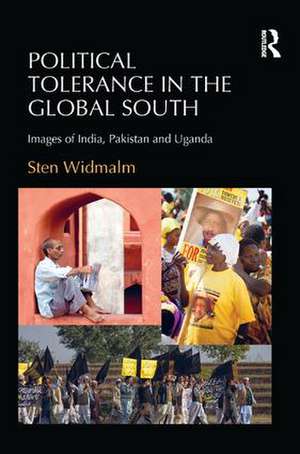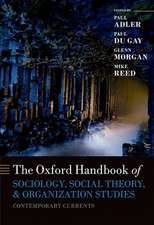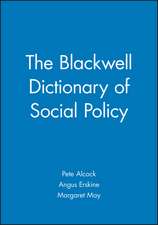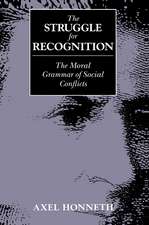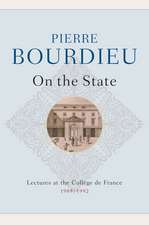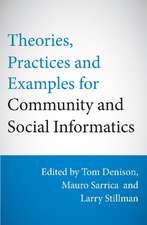Political Tolerance in the Global South: Images of India, Pakistan and Uganda
Autor Sten Widmalmen Limba Engleză Paperback – 13 oct 2017
Combining large scale survey data with in-depth interviews in each national setting, the author exemplifies the great variation of factors which are related to political tolerance, shedding light on the fundamental patterns existing in the organization of state-society relations and the ways in which they produce certain results owing to the manner in which the forces of modernization operate.
A broad and empirically informed study of what shapes the foundations of a democratic society in modernizing nations, Political Tolerance in the Global South will appeal to scholars of sociology and political science with interests in democracy, human rights, diversity and tolerance.
| Toate formatele și edițiile | Preț | Express |
|---|---|---|
| Paperback (1) | 449.41 lei 6-8 săpt. | |
| Taylor & Francis – 13 oct 2017 | 449.41 lei 6-8 săpt. | |
| Hardback (1) | 1002.63 lei 6-8 săpt. | |
| Taylor & Francis – 24 mai 2016 | 1002.63 lei 6-8 săpt. |
Preț: 449.41 lei
Nou
Puncte Express: 674
Preț estimativ în valută:
86.02€ • 93.47$ • 72.31£
86.02€ • 93.47$ • 72.31£
Carte tipărită la comandă
Livrare economică 21 aprilie-05 mai
Preluare comenzi: 021 569.72.76
Specificații
ISBN-13: 9780815366935
ISBN-10: 0815366930
Pagini: 268
Dimensiuni: 156 x 234 mm
Greutate: 0.45 kg
Ediția:1
Editura: Taylor & Francis
Colecția Routledge
Locul publicării:Oxford, United Kingdom
ISBN-10: 0815366930
Pagini: 268
Dimensiuni: 156 x 234 mm
Greutate: 0.45 kg
Ediția:1
Editura: Taylor & Francis
Colecția Routledge
Locul publicării:Oxford, United Kingdom
Cuprins
Preface
1. Political tolerance in plural societies
2. Understanding paths to political tolerance in multicultural societies
3. Fragile modernization in liberal India
4. Political tolerance in multi-conflictual Pakistan
5. Political tolerance and one-party dominated Uganda
Conclusions
Appendix
Bibliography
Index
1. Political tolerance in plural societies
2. Understanding paths to political tolerance in multicultural societies
3. Fragile modernization in liberal India
4. Political tolerance in multi-conflictual Pakistan
5. Political tolerance and one-party dominated Uganda
Conclusions
Appendix
Bibliography
Index
Notă biografică
Sten Widmalm is Professor in the Department of Government at Uppsala University, Sweden. He is the author of Decentralisation, Corruption and Social Capital: From India to the West and Kashmir in Comparative Perspective: Democracy and Violent Separatism in India.
Recenzii
‘Issues of freedom of speech, state surveillance and social tolerance have become increasingly vexed in both developed democracies and the global south. This work is therefore a timely contribution. The extensive survey material drawn from India, Pakistan and Uganda challenges a number of accepted insights into the conditions which encourage political tolerance.’ Ian Talbot, University of Southampton, UK
‘In Political Tolerance in the Global South: Images of India, Pakistan and Uganda, Sten Widmalm has provided much-needed and rarely available data on how people view the political "other".’ Omair Ahmad, The Wire
‘This path-breaking book reconceptualises our understanding of political tolerance, as well as its foundations’ - Ananya Sharma, Asian Journal of Social Science
‘Issues of freedom of speech, state surveillance and social tolerance have become increasingly vexed in both developed democracies and the global south. This work is therefore a timely contribution. The extensive survey material drawn from India, Pakistan and Uganda challenges a number of accepted insights into the conditions which encourage political tolerance.’ Ian Talbot, University of Southampton, UK
‘In Political Tolerance in the Global South: Images of India, Pakistan and Uganda, Sten Widmalm has provided much-needed and rarely available data on how people view the political "other" (...) However, you interpret the findings of the experiment mapped out in the book, it is valuable thinking and rare data on a subject that is of extreme interest to anybody interested in the flourishing or diminishing of democratic values, especially in the global south." Omair Ahmad, The Wire
‘Given the scope of the book, Widmalm has done a brilliant job in summarizing the overall results in a concise and uncomplicated way … The book demonstrates the necessity of expanding studies in political tolerance beyond the West.’ – Respons
‘This path-breaking book reconceptualises our understanding of political tolerance, as well as its foundations’ - Ananya Sharma, Asian Journal of Social Science
‘In Political Tolerance in the Global South: Images of India, Pakistan and Uganda, Sten Widmalm has provided much-needed and rarely available data on how people view the political "other".’ Omair Ahmad, The Wire
‘This path-breaking book reconceptualises our understanding of political tolerance, as well as its foundations’ - Ananya Sharma, Asian Journal of Social Science
‘Issues of freedom of speech, state surveillance and social tolerance have become increasingly vexed in both developed democracies and the global south. This work is therefore a timely contribution. The extensive survey material drawn from India, Pakistan and Uganda challenges a number of accepted insights into the conditions which encourage political tolerance.’ Ian Talbot, University of Southampton, UK
‘In Political Tolerance in the Global South: Images of India, Pakistan and Uganda, Sten Widmalm has provided much-needed and rarely available data on how people view the political "other" (...) However, you interpret the findings of the experiment mapped out in the book, it is valuable thinking and rare data on a subject that is of extreme interest to anybody interested in the flourishing or diminishing of democratic values, especially in the global south." Omair Ahmad, The Wire
‘Given the scope of the book, Widmalm has done a brilliant job in summarizing the overall results in a concise and uncomplicated way … The book demonstrates the necessity of expanding studies in political tolerance beyond the West.’ – Respons
‘This path-breaking book reconceptualises our understanding of political tolerance, as well as its foundations’ - Ananya Sharma, Asian Journal of Social Science
Descriere
Based on extensive data gathered in India, Pakistan and Uganda, this volume offers an account of the factors that shape the foundations of a society and its capacity to be democratic, but where the need for the protection of human rights is great and where the state is either weak or even constitutes a counter-force against the rights of individuals and groups. Combining large scale survey data with in-depth interviews in each national setting, the author exemplifies the great variation of factors which are related to political tolerance, shedding light on the fundamental patterns existing in the organisation of state-society relations and the ways in which they produce certain results owing to the manner in which the forces of modernisation operate.
